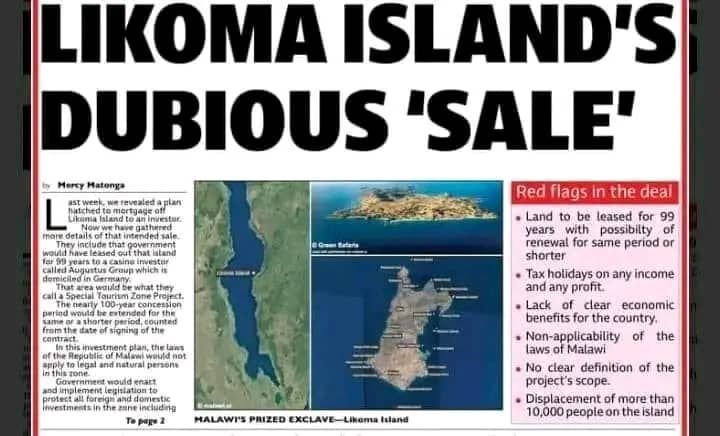By Burnett Munthali
Following the failed attempt to secure a K20 billion project to print Chelsea jerseys, the Ministry of Tourism is embroiled in another contentious situation as it seeks to sell Likoma Island to a German investor known as Muyuda. This move has raised significant concerns among Malawians regarding the implications for local residents and the island’s future.
For the past 99 years, Likoma Island has been managed by local leaders and residents, who now face the prospect of losing control over their home. Reports indicate that more than 10,000 residents may be displaced as they seek alternative accommodations if the sale proceeds.

Muyuda has reportedly claimed that he will not pay any taxes on the island, raising eyebrows about the financial implications for the government and local economy. Moreover, there are no competitors on the island, giving the investor a unique position that could monopolize tourism and business opportunities.
Critics argue that the legal frameworks governing Malawi do not appear to apply on Likoma Island, essentially treating it as a separate entity. This raises questions about the governance and regulatory environment if the island is sold. The tourism ministry has initiated a lease for the island, but it seems there was no consultation with the Ministry of Lands or local chiefs, further complicating the situation.
Details surrounding the sale price remain unclear, yet it is suggested that the Minister of Tourism is privy to this information, raising concerns about transparency and accountability. Locals fear that they will be excluded from decision-making processes that directly affect their lives.
If the sale goes through, Likoma Island could become a no-go zone for current landowners, irrespective of their existing property rights. The investor is expected to bring in his own security forces, limiting the power of Malawian police to intervene or protect local interests.
The implications of this sale could result in a new governance structure for the island, with the investor potentially acting as a de facto president, creating and enforcing his own laws without regard for Malawian legal frameworks.
As the situation develops, the Malawian public remains wary of the consequences of this proposed sale. Many are calling for increased transparency, community involvement, and adherence to local laws to ensure that the rights and welfare of the island’s residents are protected. The future of Likoma Island hangs in the balance, as its fate is now intertwined with external interests that may not align with the needs of its people.


